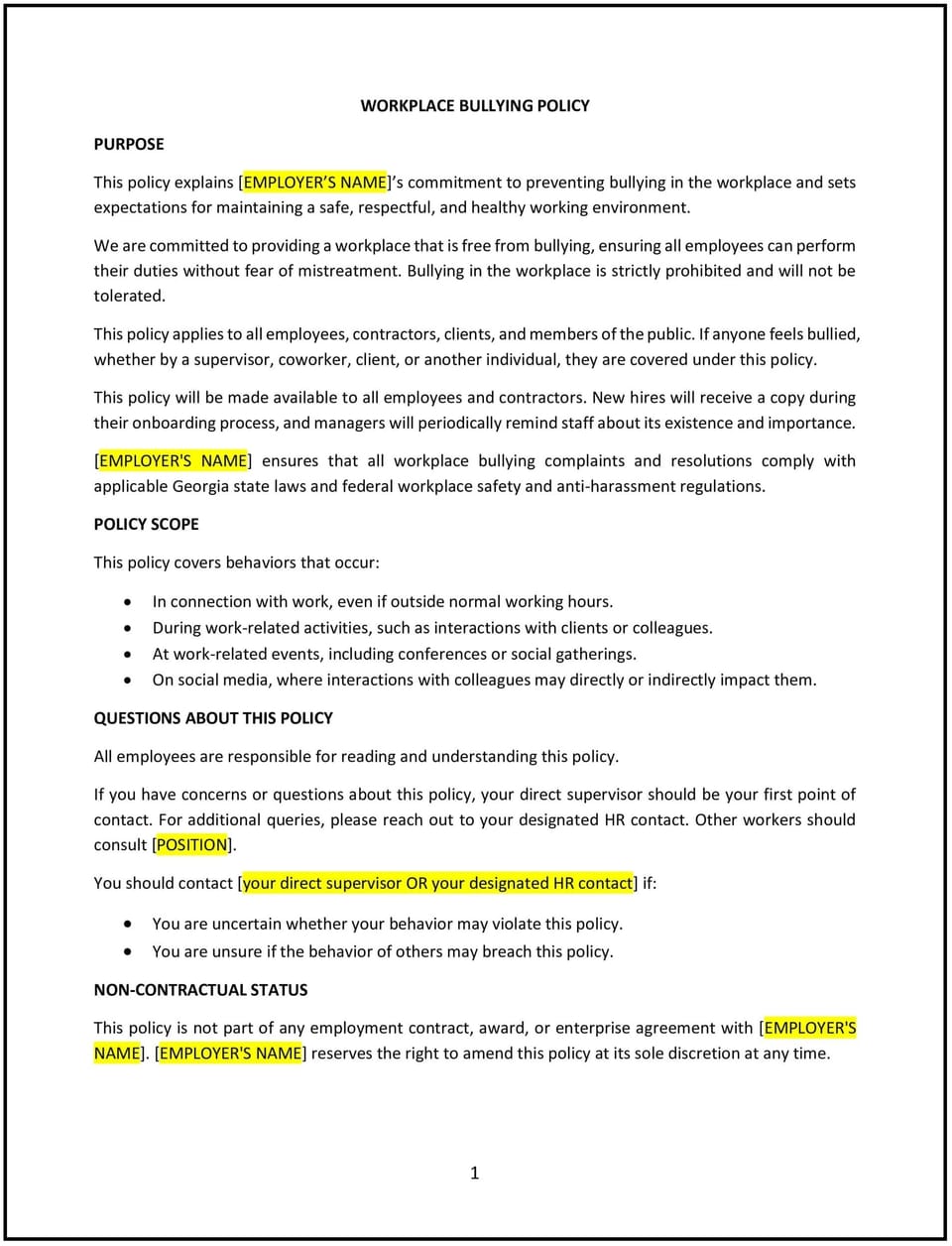Workplace bullying policy (Georgia): Free template

Workplace bullying policy (Georgia)
This workplace bullying policy is designed to help Georgia businesses create a respectful and productive work environment by addressing and preventing bullying behavior. The policy defines workplace bullying, outlines reporting procedures, and provides guidelines for resolving incidents.
By implementing this policy, businesses can foster a positive workplace culture, protect employee well-being, and reduce workplace conflicts.
How to use this workplace bullying policy (Georgia)
- Define workplace bullying: Clearly outline behaviors that constitute bullying, such as verbal abuse, intimidation, exclusion, or spreading false information.
- Establish reporting procedures: Encourage employees to report incidents of bullying promptly, using a confidential and accessible process.
- Provide investigation guidelines: Specify how reports of bullying will be reviewed and addressed, ensuring fairness and confidentiality.
- Include consequences: Outline disciplinary actions for employees found to have engaged in bullying, ranging from warnings to termination.
- Promote prevention: Offer training and resources to help employees and managers recognize and prevent bullying behaviors.
- Designate a point of contact: Identify a person or team responsible for handling bullying reports and supporting affected employees.
- Review regularly: Periodically assess the policy to reflect changes in workplace practices, employee feedback, or Georgia-specific needs.
Benefits of using this workplace bullying policy (Georgia)
Implementing this policy provides several advantages for Georgia businesses:
- Enhances workplace culture: A respectful and supportive environment promotes productivity and collaboration.
- Protects employees: Clear procedures help address bullying promptly and reduce its impact on employee well-being.
- Reduces turnover: Addressing workplace bullying improves morale and retention rates.
- Minimizes conflicts: Proactive prevention and resolution reduce workplace disputes.
- Reflects Georgia-specific practices: Tailoring the policy to local norms ensures relevance and practicality.
Tips for using this workplace bullying policy (Georgia)
- Communicate expectations: Share the policy with all employees and emphasize the importance of maintaining a respectful workplace.
- Provide training: Offer regular sessions on recognizing, preventing, and addressing bullying behaviors.
- Encourage openness: Foster a culture where employees feel comfortable reporting bullying without fear of retaliation.
- Monitor workplace dynamics: Regularly assess team interactions to identify and address potential bullying issues early.
- Offer support: Provide resources such as counseling or employee assistance programs to affected employees.
Q: What behaviors are considered workplace bullying?
A: Workplace bullying includes actions such as verbal abuse, intimidation, exclusion, spreading rumors, or undermining an employee’s work.
Q: How should employees report bullying?
A: Employees should report incidents to their manager, HR, or a designated contact using the process outlined in the policy.
Q: What happens after a bullying report is filed?
A: Reports will be investigated promptly, ensuring confidentiality and fairness, and appropriate actions will be taken based on the findings.
Q: What are the consequences for employees who engage in bullying?
A: Consequences may include warnings, mandatory training, suspension, or termination, depending on the severity of the behavior.
Q: How can businesses prevent workplace bullying?
A: Businesses should provide training, promote a respectful culture, and address concerns proactively to prevent bullying.
Q: Are employees protected from retaliation for reporting bullying?
A: Yes, businesses should emphasize that employees who report bullying will not face retaliation or adverse actions.
Q: How often should this policy be reviewed?
A: The policy should be reviewed annually or as needed to reflect changes in Georgia workplace practices or employee feedback.
This article contains general legal information and does not contain legal advice. Cobrief is not a law firm or a substitute for an attorney or law firm. The law is complex and changes often. For legal advice, please ask a lawyer.


